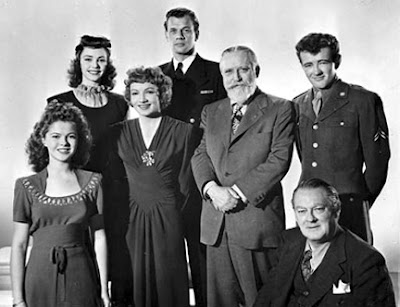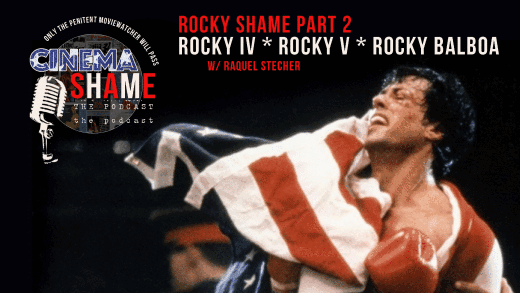 |
| Jennifer Jones, Claudette Colbert, Shirley Temple in Since You Went Away (1944) |
"This is a story of the Unconquerable Fortress: the American Home..."
During WWII, producer
David O. Selznick was searching for a way to contribute to the war effort. He was offered two opportunities by the government. The first was to produce a radio program, an idea he flatly turned down. Then the Navy approached him about starting a bureau of photography. Selznick took interest in this proposal but the project never materialized. Instead Selznick would produce a movie. But he didn't want to make a war movie. He needed to tell the story of WWII as it was experienced on the home front by those left behind. Fearful that he would be forever known as the producer of
Gone With the Wind, this was an opportunity to not only make a great movie but to move from under his own shadow of fame.
The year was 1942 and Selznick was looking for a WWII home front story to be produced at Selznick International Studios. It took him more than a year to find just the right story. Author Margaret Buell Wilder had written a column in the Dayton Journal Herald called "Letters to a Soldier from His Wife." Wilder was a mother of two teenage daughters and while her husband was off at war she made ends meet by taking in boarders. The column proved popular and was even picked up later by the national women's magazine
Ladies Home Journal. The letters were compiled into a book and published with the title
Since You Went Away. Once Selznick discovered Wilder's book he knew this would be the film he wanted to make. At first Wilder adapted the screenplay but the final result was unsatisfactory to Selznick who would dominate every aspect of the making of the movie. He took Wilder's screenplay, broke it down and rebuilt it from the ground up.
The end result was the 3-hour family melodrama
Since You Went Away (1944). The movie stars
Claudette Colbert as Anne Hilton. Her husband Tim has gone off to war leaving her behind with their two teenage daughters Jane (
Jennifer Jones) and Brig (
Shirley Temple). The Hilton family face hardships ahead including rationing, cut backs, opening their home to boarders to make ends meet and worried about the family patriarch when they get the news that he is MIA. In their circle is Lieutenant Tony Willett (
Joseph Cotten), Anne's former flame who still holds a torch for her. Then there is retired Colonel William Smollett (
Monty Woolley), the crotchety old boarder who likes his breakfast a certain way and has unrealistic expectations for his shy grandson. Corporal Bill Smollett (
Robert Walker) is said grandson. He wants nothing but to make his grandfather proud and to spend every waking moment with the object of his affections Jane Hilton. Helping keep the Hilton household together is Fidelia (
Hattie McDaniel) who pitches in to help the family even when they can't afford to pay her. Threatening to break the resolve of the Hiltons is uppity socialite Emily Hawkins (
Agnes Moorehead). To her the war is an impediment to her expectations of a proper social life. The saga follows the family as Anne, Jane and Brig journey through the tough months ahead and deal with major sacrifices, death and the unknown.
One of the aspects about WWII that fascinates me is life on the home
front. What was it like for those left behind? The anticipation of the
safe return of their loved ones who are fighting overseas. The struggle
to keep the family going through a time of uncertainty. The rationing, the cut backs, the housing shortage, the buying and selling of war bonds and more.
Since You Went Away is on the surface a sappy melodrama but explores all of the aspects of home front life in a profound way.
 |
| Cast of Since You Went Away (1944) |
The movie was mainly directed by
John Cromwell but he also had help from Andre De Toth who worked
on some of the scenes and Selznick who stepped in as director when
Cromwell fell ill. Max Steiner produced the score which includes an overture and an intermission.
Since You Went Away features a grand cast of players. Lionel Barrymore has a small role as a preacher. Guy Madison makes his film debut as a rival for Jane's affections. Alla Nazimova appears in the final role of her career. A sharp eye will spot Dorothy Dandridge, Butterfly McQueen and Rhonda Fleming in certain scenes. Jennifer Jones and Robert Walker were married at the time of filming but separated. Jones and Selznick would later marry. Selznick had coaxed Shirley Temple out of her early retirement for this film. Actress Katharine Cornell campaigned for the role of Anne but lost out to Claudette Colbert who was a bigger star.
Since You Went Away (1944) proved to be a success. It struck a chord with contemporary audiences who flocked to the theaters to see it. The film was nominated for nine Academy Awards and Max Steiner won for Best Score. A newspaper announcement prior to the film's release proclaimed that
Since You Went Away would be four hours long noting that it was longer than Selznick's
Gone With the Wind. The film was edited down several times and the final version is just a few minutes shy of 3 hours.
I had avoided this film for years mostly for fear of watching Jennifer Jones and Robert Walker together. The way their marriage ended has always pained me. I'm glad I overcame that to finally watch the film.
Since You Went Away is a favorite of my good friend Jessica of
Comet Over Hollywood who encourage me to see it. I fell for the story hook, line and sinker and was a sobbing mess at the end. It's overly long and sentimental but if you want to immerse yourself in the history of WWII especially the films of that era, it's not one to miss.
Since You Went Away (1944) is coming out from Kino Lorber on Blu-Ray later this month. The disc includes the Roadshow edition featuring the full overture and intermission of Max Steiner's score as well as a selection of trailers as well as closed captions. The Blu-Ray will make a great present for the classic film enthusiast and WWII history buff in your life.
Many thanks to Kino Lorber for sending me the Blu-Ray to review!
Sources
TCMDB
Google Newspaper Archive
Hollywood Enlists!: Propaganda Films of World War II by Ralph Donald















































